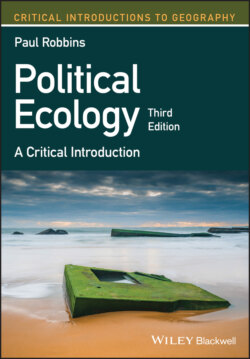Читать книгу Political Ecology - Paul Robbins - Страница 39
Historicism, landscape, and culture: Carl Sauer
ОглавлениеInterest in the historical development of cultures and human impacts on the landscape, it must be remembered, was not much cultivated in turn‐of‐the‐century geography. This was so much the case that the publication of an essay in 1925, which simply defined the objective of geography as the interpretation of landscape and humanity's role in changing that landscape, was considered a breakthrough.
That essay, “The Morphology of Landscape” by Carl Ortwin Sauer (1965a), led the field of geography into a new tradition of cultural landscape studies for several decades. Centered at the University of California at Berkeley, and shepherded by Sauer himself, this new school of scholarship directed itself to research human use of nature, especially the impact of human activities. Historical and archaeological data were joined with geomorphologic and soil studies to create bold, long‐term accounts of how places came to look the way they did (Speth 1981). Inverting determinism, historical landscape studies sought to explain the physical patterns on the land (forest cover, soil erosion, stream flows) in terms of human culture rather than the other way around. Rather than focusing on the functional‐causal explanations typical of previous determinism, this approach focused on the emergence and adaptation of culture over time, diffusion of cultural traits, and interaction between cultures (Speth 1978). Sauerian human–environment research would concern itself with detailed study of the how of local cultures, less than the why.
Sauer's concerns were also directed towards what he viewed as the ecological crisis of Western civilization. His strongly normative view of human impact on nature, inspired at least in part by the work of Marsh, was explicit in its castigation of environmental degradation and its characterization of the modern commercial economy as unsustainable:
To this review of some of the suicidal qualities of our current commercial economy, the retort may be that these are problems of the physical rather than social scientist. But the causative element is economic; only the pathologic processes released or involved are physical. The interaction of the physical and social processes illustrates that the social scientist cannot restrict himself to social data alone.
(Sauer 1965b, p. 152)
His interest in these topics was probably formed during his work for the Soil Conservation Service (SCS) and the Michigan Land Economic Survey (MLES) prior to his arrival at Berkeley. These services probably helped to foster both his concern for the condition of the environment and his interest in the everyday affairs of working people (Leighly 1965). This was coupled with Sauer's enduring belief, rooted in his field experience, that indigenous practices and agro‐ecologies made sense. Displacing them through modernization could only lead to disaster. In a letter to Joseph Willits, who was then the director of social sciences at the Rockefeller Foundation, the activities of which militantly promoted precisely such modern interventions during the Green Revolution in Mexico, Sauer wrote:
A good aggressive bunch of American agronomists and plant breeders could ruin the native resources for good and all by pushing their American commercial stocks … This thing must be approached from an appreciation of the native economies as being basically sound.
(cited in Perkins 1990, footnote 73)
Though the political and economic urgency in Sauer's worldview is seldom reflected in his research, his legacy for political ecology is non‐trivial. Sauer established the Berkeley school of geography as a tradition of fieldwork. This empirical tradition sent researchers into the countryside and around the world, exploring the social world of people as expressed in their use of nature. This set a research agenda that would live on into contemporary political ecology, ranging from footwork in urban slums on access to water (Swyngedouw 2004) to deep historical ecology revealing the role of slaves in creating and maintaining complex systems of ecological knowledge (Carney 2001; Carney and Rosomoff 2010) (Box 2.2).
